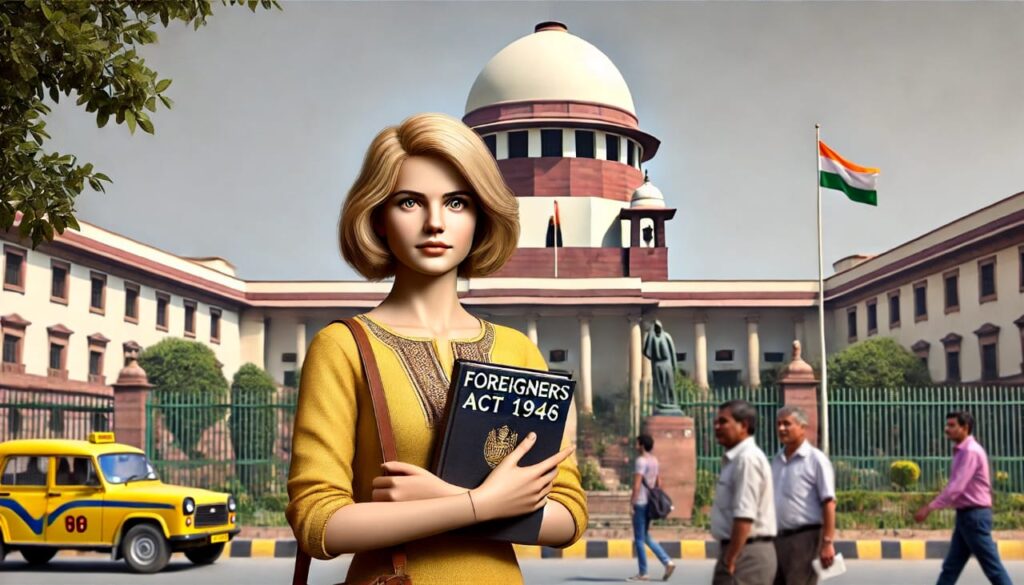Rakia Imran
| Case Name | Relief Granted to Ukrainian National for Exit Permit
|
| Citation | W.P.(C) 342/2025 |
| Decided on | 14.01.2025 |
| Coram | HON’BLE MR. JUSTICE SACHIN DATTA |
| Petitioner | AHLAIA NOHINA |
| Respondent | UNION OF INDIA & ORS |
| Provisions Involved |
Section 14 of the Foreigner’s Act, 1946 |
Introduction
The High Court of Delhi pronounced a judgment in the matter of “Ahlaia Nohina v. Union of India” [WP (C) 342/20225] dated 14th January, 2025 granting relief to a foreign national (Ukrainian) over expiry of her visa in her stay in India and directed Foreign Regional Registration Office (FRRO) Delhi to grant her exit permit without penalty under Section 14 of Foreigner’s Act, 1946. The matter was taken up by Justice Sachin Datta.
Factual Background
The petitioner is a Ukrainian citizen who is temporarily residing in Germany due to the ongoing Russia-Ukraine war. She came to India for a spiritual retreat and has been staying on a tourist visa since December. Her visa was due to retire on 6th January 2025. She applied for an exit permit with the concerned authorities, mainly FRRO Chennai, which delayed the process of her exit and she was not allowed to board her return flight at IGI Airport, Delhi. The bone of contention was one ‘Form C’ which is needed as a last proof of residence of the applicant. Due to technical errors, the hotel where she was staying in Chennai could not upload the requisite form on e-portal of FRRO Chennai. As a result, the petitioner approached the court to expedite the process as she did not want penalties on her stay and it was also a violation of Section 14 of Foreigner’s Act, 1946 to illegally stay in India without a valid visa.
Key Legal Issues
- Should the petitioner be penalized for overstaying her visa period when the delay was caused by factors beyond her control?
- To what extent should administrative authorities accommodate exceptional circumstances in procedural requirements?
- What is the scope of judicial intervention in cases where administrative delays infringe upon individual rights?
Arguments by the Petitioner
Represented by a legal team comprising Mr. Vivek Tiwari, Mr. Aditya Trivedi, and Ms. Subhi Pastor, the petitioner raised the following points:
- The petitioner argued that it was a matter beyond her control and the delay in uploading Form-C was entirely due to the hotel’s negligence.
- Imposing a penalty under Section 14 of the Foreigners Act, 1946, would be unjustified as the petitioner had acted in good faith and promptly sought redressal..
- She sought immediate relief to avoid further inconvenience and facilitate her return to Germany.
Arguments by the Respondents
The Union of India, represented by Ms. Nidhi Raman and her team, presented the following counterarguments:
- The respondents argued that compliance with Form-C requirements was essential for national security and immigration management.
- They emphasized that the FRRO needed time to verify documents and complete procedural formalities to issue an exit permit.
- The government clarified that since the petitioner’s overstay period was within 15 days, no penalty would be imposed if compliance was achieved within the stipulated time frame.
High Court Judgment
The Delhi High Court pronounced the verdict in favour of the petitioner, granting her the sought relief. The Court directed FRRO Delhi to process the request of exit permit of the petitioner, with a new Form-C. As she is currently staying at a private residence in Delhi, she was allowed by Court to file a Form-C accordingly and FRRO was directed to expedite the process.
The Court also granted relief from the penalty under Section 14 of Foreigner’s Act, 1946 as the current stay of the petitioner did not cross the 15 day’s time period of expiry of visa. The petitioner was also allowed to file the Form-C within 48 hours of the date of the order (14 January 2025).
The Court, in peculiar circumstances of the matter, also granted relief from any penalty by the respondents for her stay in India beyond the validity of visa. The respondents were also directed to allow the petitioner a time frame of 72 hours to make her travel arrangements and leave India after exit permit is granted by FRRO (Delhi). Accordingly, the petition was disposed of.
To conclude, the above case underlines the inevitable and essential balance between legal requirements and the protection of individual liberties. By promptly prioritizing justice and fairness, the Delhi High Court ensured that the petitioner’s fundamental rights were not overshadowed or infringed by any administrative delays.
Such decisions strengthen public confidence in the legal system, ensuring that administrative processes remain fair and just.

